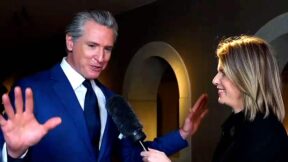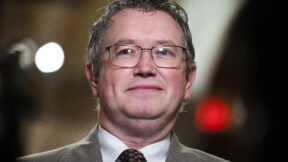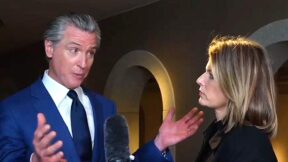‘They Print The Narrative, They Don’t Print Truth’: Bill Maher Slams Journalists In Argument With Seth MacFarlane
Comic and pundit Bill Maher tangled briefly with actor and Family Guy creator Seth MacFarlane on Friday over whether the media is to be trusted anymore in an age of extreme partisanship.
On the latest Real Time With Bill Maher from HBO, the host brought up the subject of social media, and how some states are cracking down on the negative influence that the medium has on young people and society at large.
But that conversation quickly got sidetracked into one about the reliability of modern journalism in the United States, after MacFarlane was making a point about the comments left on articles online.
MacFarlane said that when people scroll down to read the comments it can radicalize their opinion of what they just read “one way or the other.”
As MacFarlane was suggesting that journalists go through a rigorous process before putting something online that random users do not, Maher interrupted to ask, “What if it’s just slanted? What if it’s not wrong? It’s just slanted?”
Seeming to miss the point in pointing out when something is biased, MacFarlane suggested sending a “letter the editor,” which is something people used to do before the majority of Instagram readers were born.
Maher said that MacFarlane seems to “trust journalists more than I do,” and MacFarlane was surprised when Maher said he trusts some but “not a lot” of journalists.
“They print the narrative. They don’t print truth,” said Maher.
MacFarlane then said that believing that is what Donald Trump wants, and Maher responded by pointing out the flawed appeal to spite argument, and said media generally reports the side of the story their audience will feel affirmed by reading.
California Democrat Rep. Adam Schiff agreed that people read news from sources they want to hear, which prompted Maher to say “They’re in the audience stroking business. That’s what the media does.”
The debate concluded on MacFarlane saying that’s a generalization that might be overly broad.
MAHER: Two interesting developments in the world of media. Social media. The Florida House, they passed a bill banning, children. Well, you know, children under 16 from using social media. And in New York, about as different as you can get from Florida politically. Mayor Adams, the first to declare social media a mental health crisis. Compared to…
(APPLAUSE)
MAHER: Well. I’ve found a way to unite the country. So, any comments on these developments in the social media world?
MACFARLANE: There was. There was a–. I’m trying to remember the name of the book I think was called The Chaos Machine.
MAHER: Yeah. You gave it to me.
MACFARLANE: Yeah. By…
MAHER: Remember?
MACFARLANE: Yeah. By Max Fisher, that that, talked about the fact that when you read an article on social media, like, let’s say you follow the New York Times on Instagram and you read one of their articles and you process it a certain way. The second you start reading the comments, your initial impression of that article is radicalized one way or the other. And first of all, I have no idea what these outlets gain by allowing comments on their, on their sites. It’s like this reporter took the time to research this, to fact check it oversight from an editor, and if they got it wrong, then they have to print a retraction.
MAHER: What if it’s just slanted? Not wrong but j–.
MACFARLANE: What?
[00: But what if it’s just slanted? What if it’s not wrong? It’s just slanted. That’s what somebody is pointing out in the column.
MACFARLANE: Then write a letter to the editor! Do your research and formulate your argument coherently.
MAHER: But that appears a week later.
MACFARLANE: So what? What’s a week?
MAHER: Because by then I’ve forgotten it or I don’t see that.
MACFARLANE: It’s like there’s this, there’s this, this thing we take for granted, now that the journalist who did the work gets to have their piece put on the same shelf as everyone else’s spur of the moment bullshit.
MAHER: You seem to trust journalists more than I do.
MACFARLANE: Trust certain journalists. Yeah.
MAHER: I do too, certain ones, I do. Not a lot and.
MACFARLANE: Not a lot?
MAHER: No, and I’m — everything I read. Whatever source. It’s only half the truth. They print, they print the narrative. They don’t print truth.
MACFARLANE: That’s a generalization, though.
MAHER: Well, it is, but it’s because it’s generally true.
MACFARLANE: Really?
MAHER: Yeah. They print, they print the side of the story that–
MACFARLANE: By the way, that’s exactly what Donald Trump wants. What you just said is exactly what he wants
MAHER: It doesn’t matter.
MACFARLANE: Don’t trust. Don’t trust the reporters. Don’t trust the journalists.
MAHER: Well, Hitler was a vegetarian. Doesn’t mean I’m like… But they print the half that they want their — that is going to make people like you who are a partisan, very partisan. You want to read something that. Oh, that that makes me feel good.
MACFARLANE: I read John Bolton’s book, for fuck’s sake. I’m not partisan, I slogged through that thing. Jesus Christ.
SCHIFF: You have my condolences.
MAHER: Yeah, I don’t know why you would do that.
SCHIFF: I think this is the most crosscutting challenge we have at all, overall, which is. people simply don’t get their information from the same place they tune into the news they want to hear, reinforce the views they already have. They have social media algorithms queue up what they want to see.
MAHER: They’re in the audience stroking business. That’s what the media does, that’s what.
SCHIFF: They are.
MACFARLANE: To some extent that’s true, but I don’t th– I think to generalize the majority of it is, is just not…
MAHER: All right. Well, I’m also in the audience stroking business, so I have to go to New Rules.
Watch the clip above via HBO.
New: The Mediaite One-Sheet "Newsletter of Newsletters"
Your daily summary and analysis of what the many, many media newsletters are saying and reporting. Subscribe now!






Comments
↓ Scroll down for comments ↓